Language attitudes of Vietnamese undergraduates towards English: An investigation at school of advanced studies of Ho Chi Minh city open university
The investigation reported in this paper is carried out with 444 undergraduates enrolled in the first semester of academic year 2014-2015, which seeks to examine language attitudes towards English language achievement and formation of ethnic identity of Vietnamese undergraduates at Ho Chi Minh City Open University (HCMCOU). The investigation surveys this topic by discussing the study of language attitudes, effects of language attitudes on language achievement, English in Vietnam and awareness of Vietnamese ethnic identity and issues about the relationship between language attitudes and language achievement. The questionnaire survey is conducted to examine students’ language attitudes, which is adapted from Axler et al. (1998) as cited in Liu & Zhao (2011). The results show that students hold positive attitudes towards English and are extrinsically and intrinsically motivated to learn English. They show their sense of Vietnamese patriotism in preserving linguistic and cultural identity on account of nearly 60 per cent of wishing to learn Vietnamese well. Concurrently, they illustrate their appreciation of English status in light of 40 per cent showing their preference to learn good English first
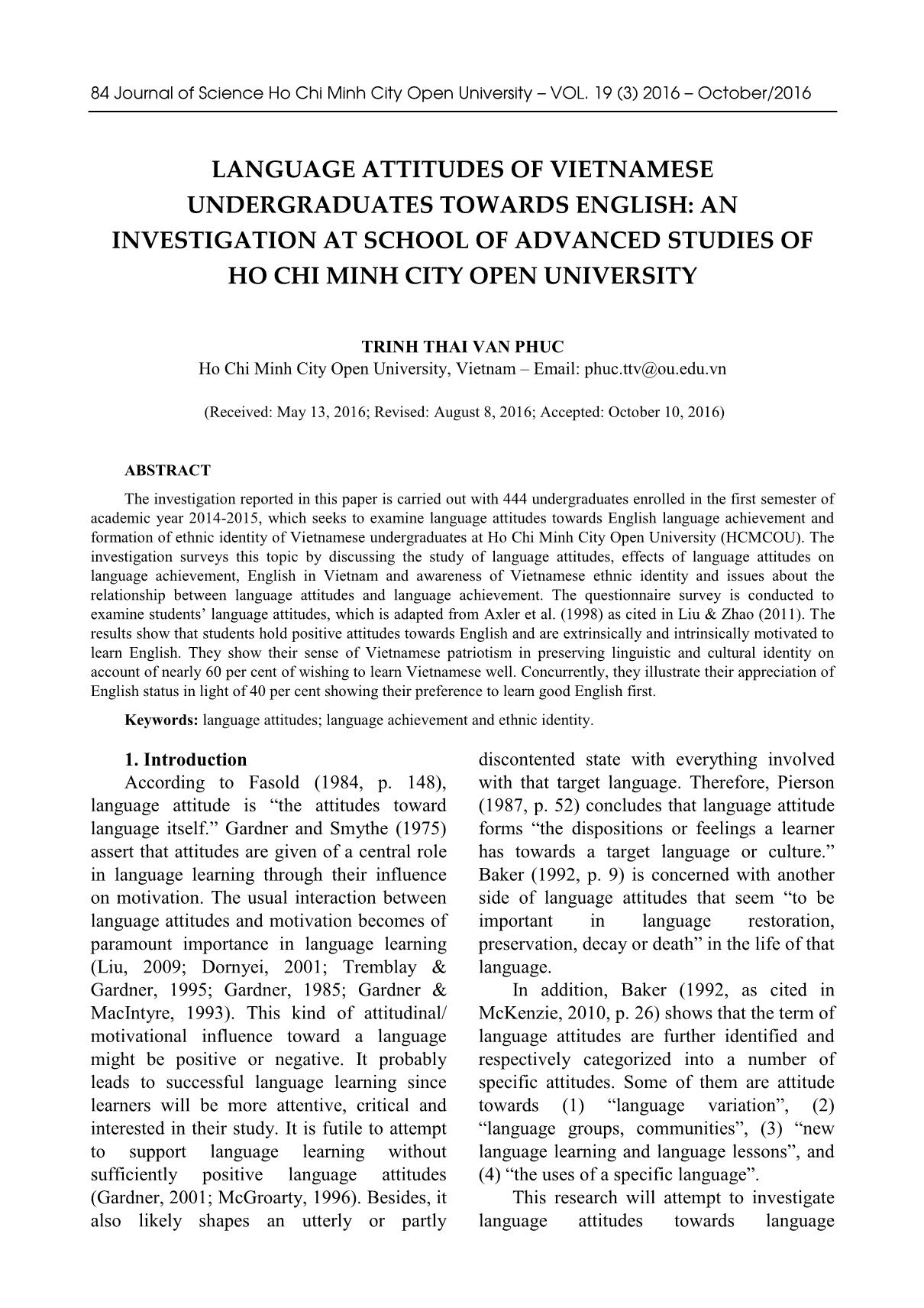
Trang 1
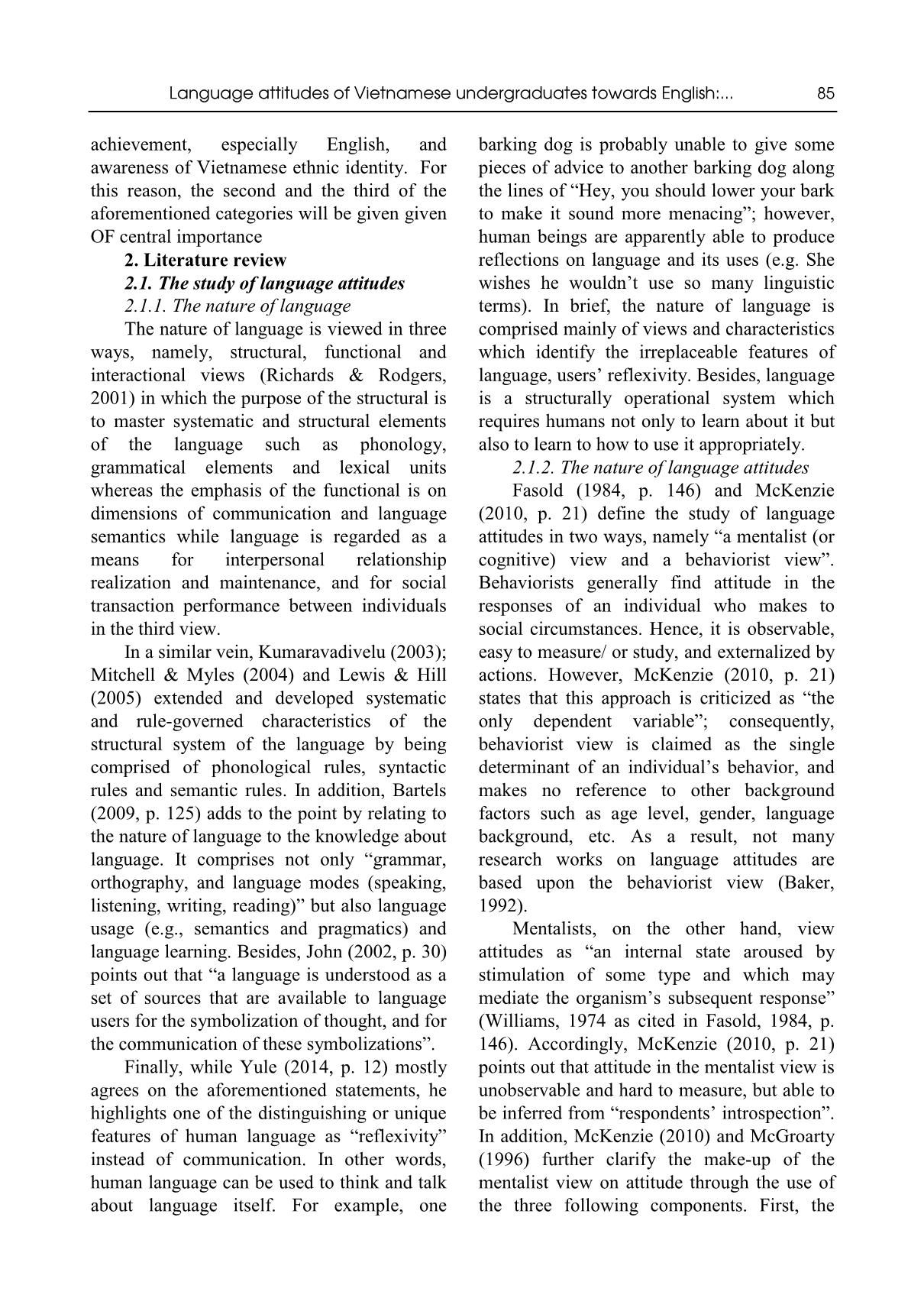
Trang 2
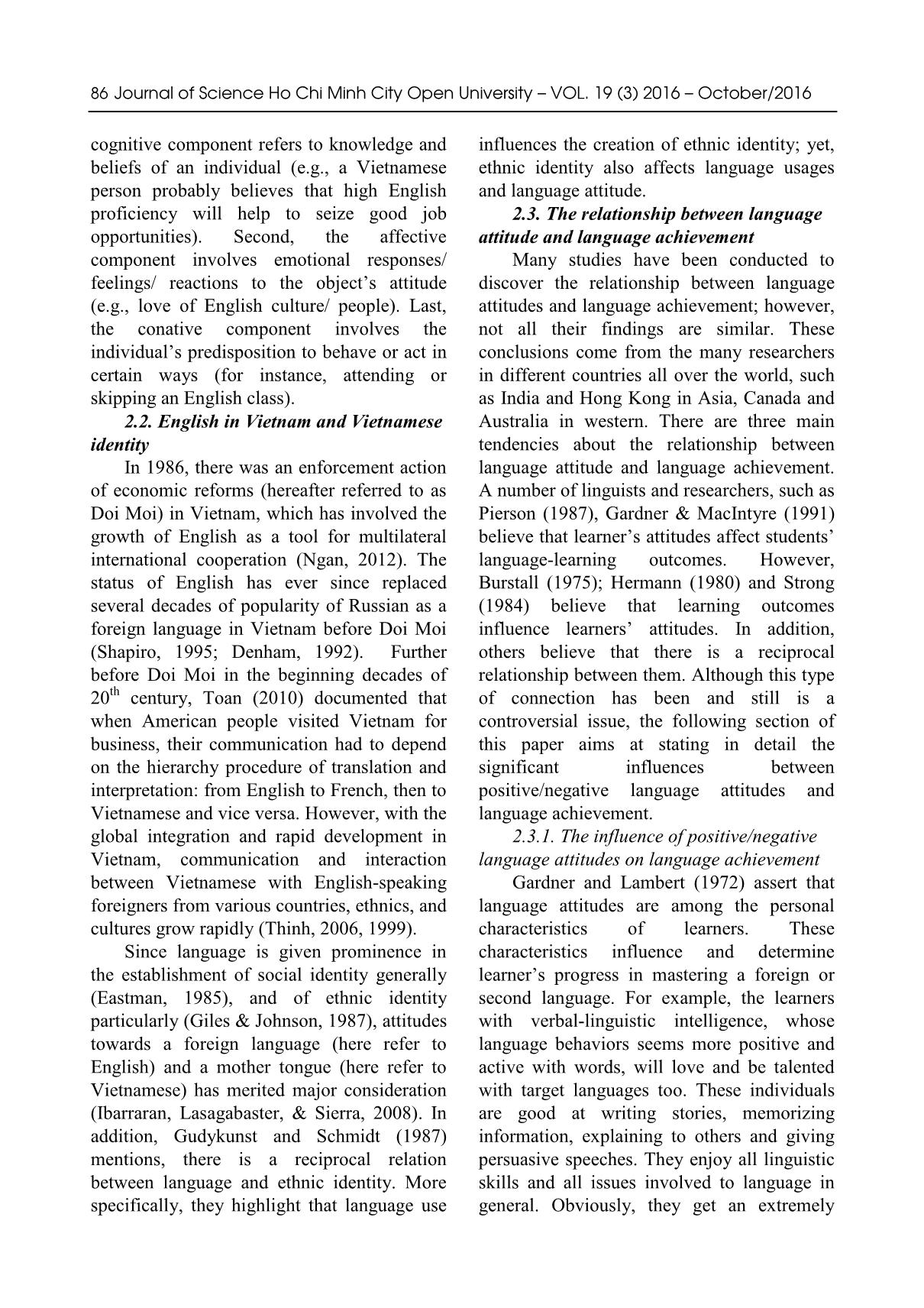
Trang 3
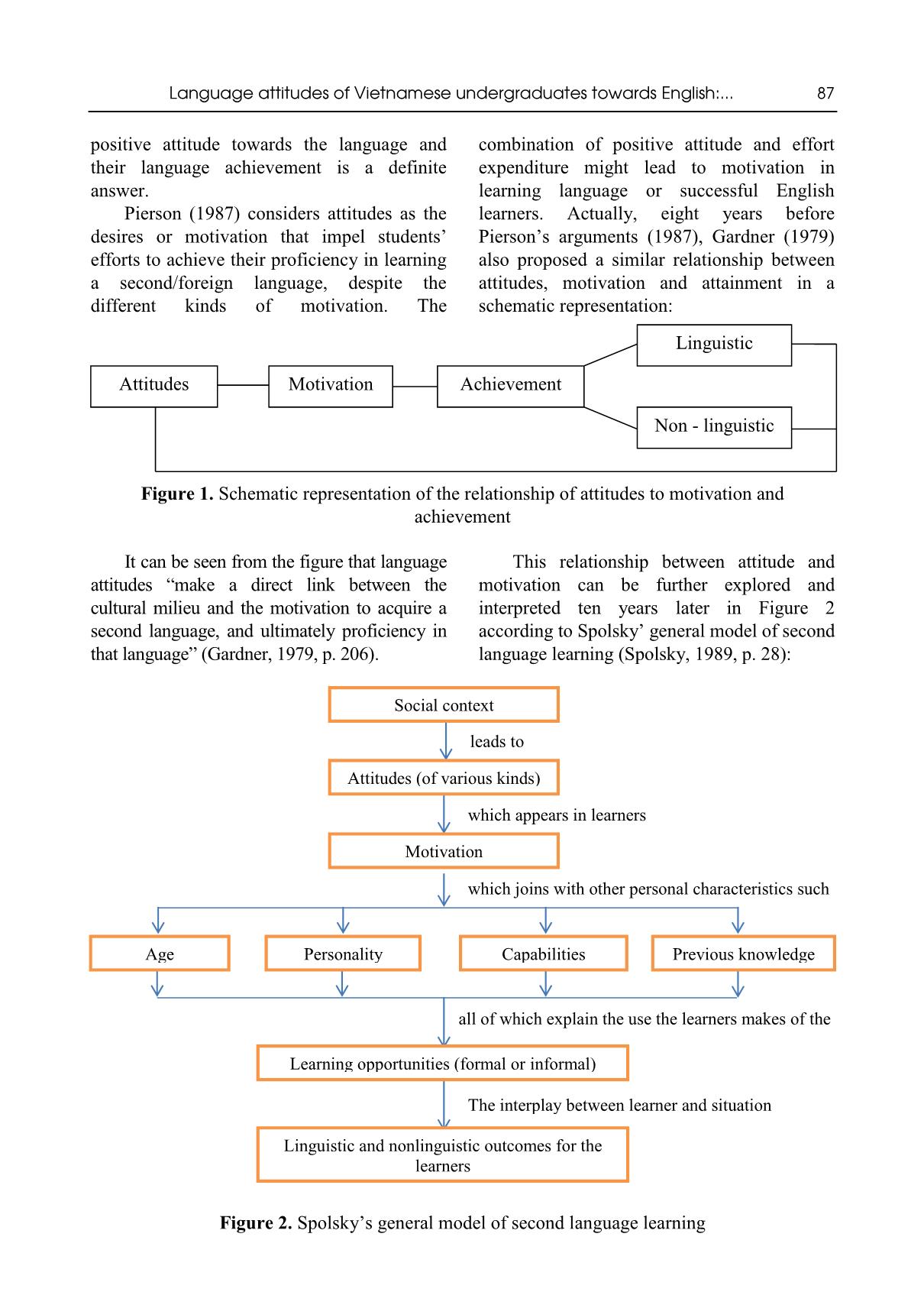
Trang 4
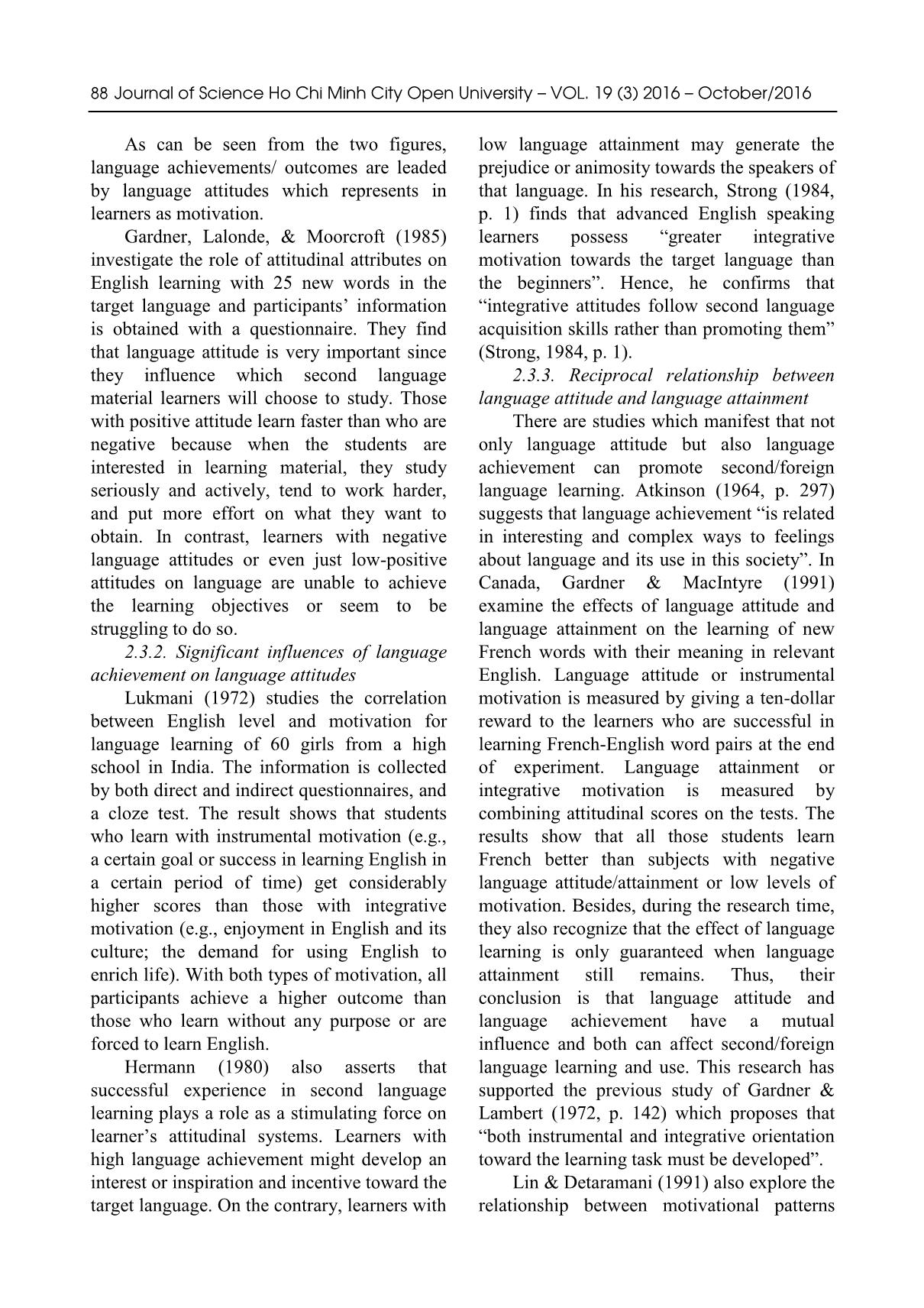
Trang 5
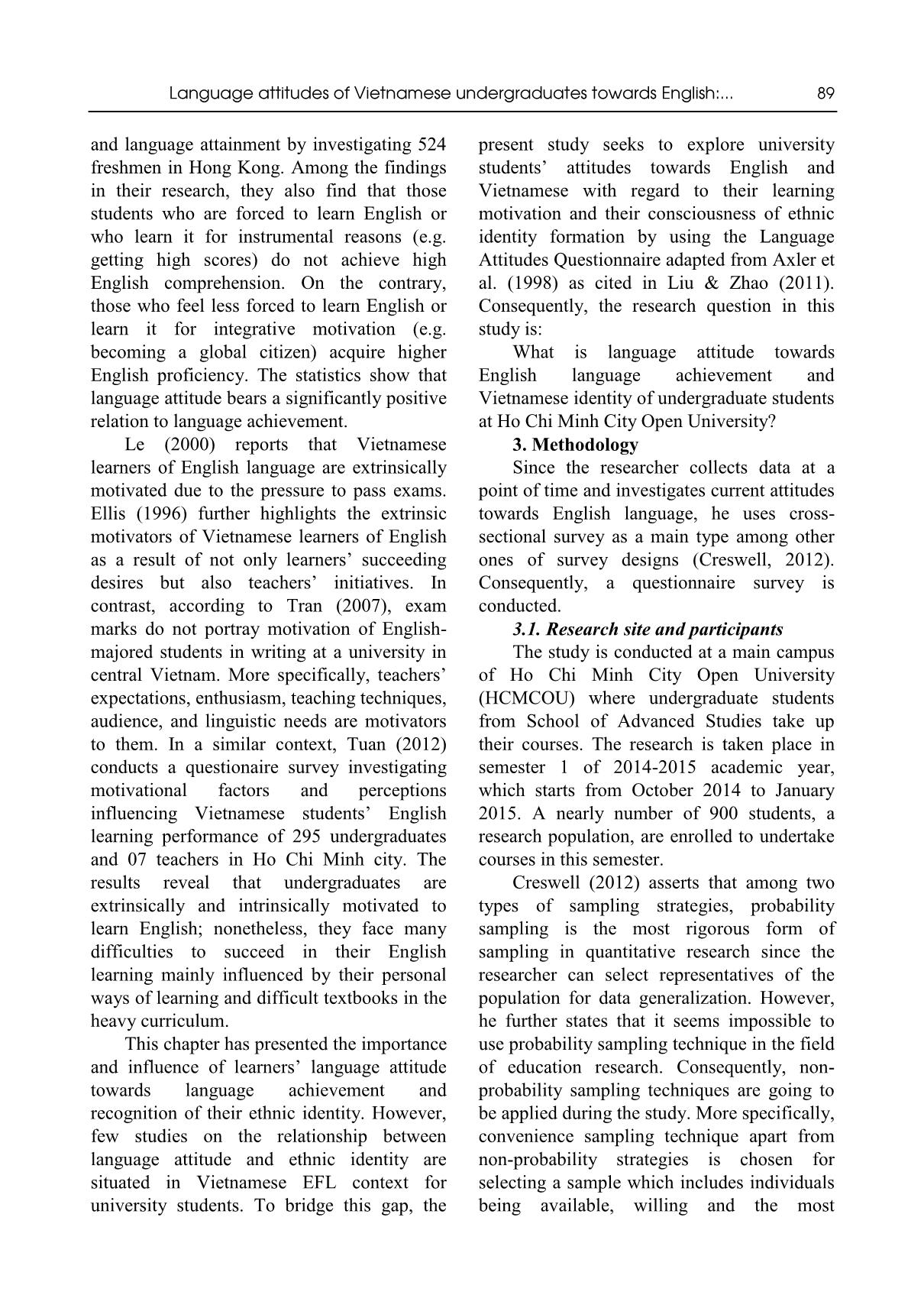
Trang 6
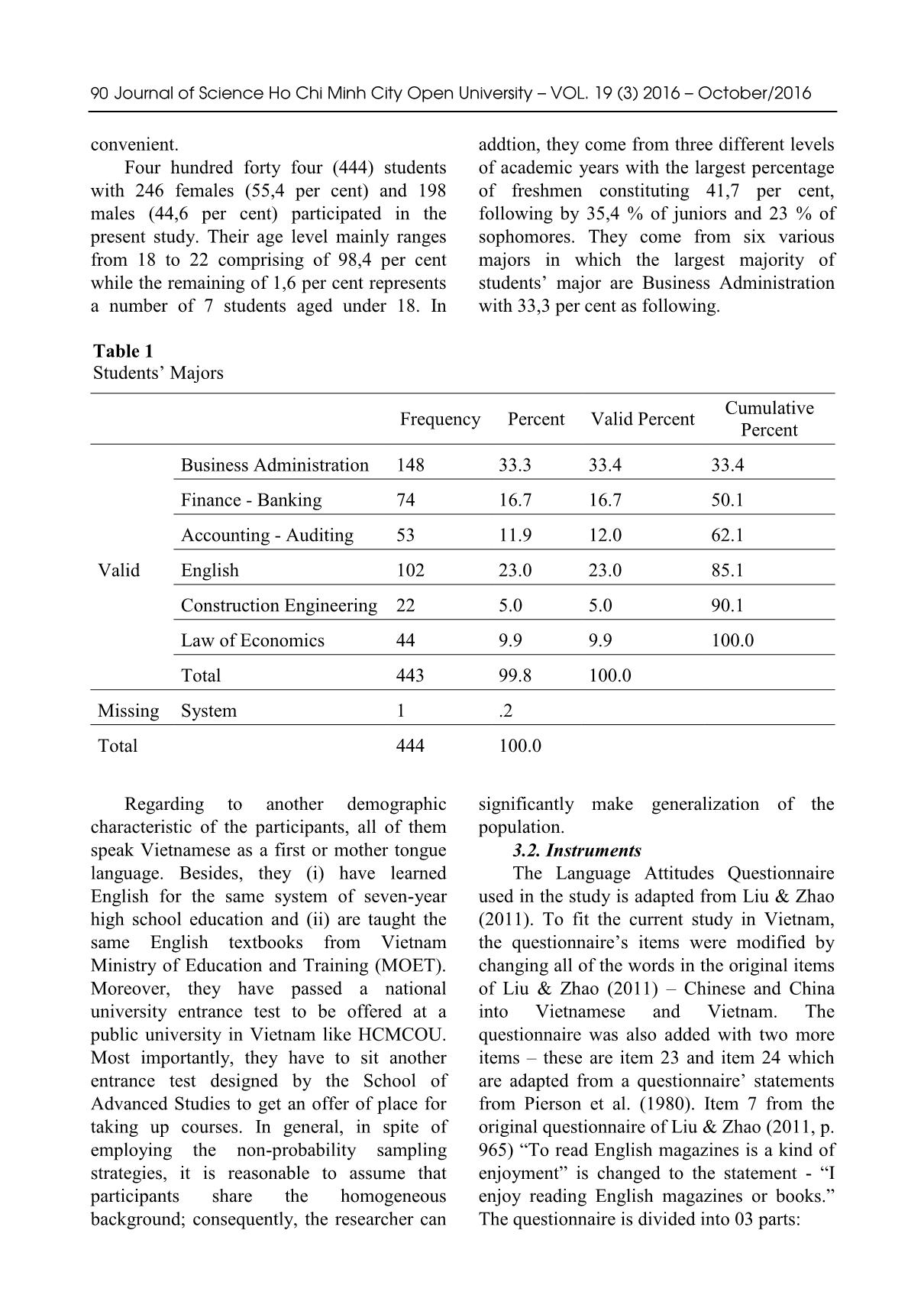
Trang 7
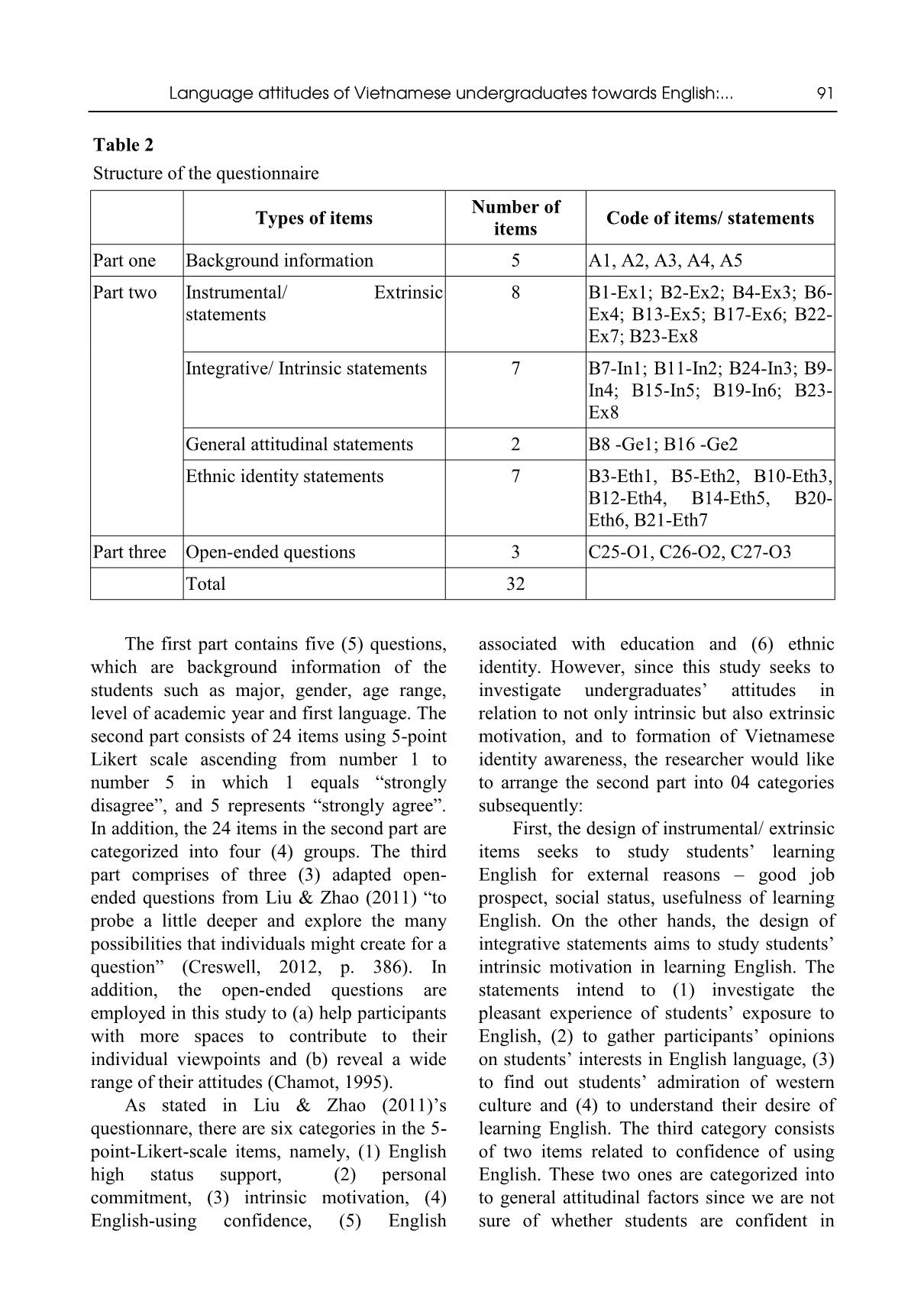
Trang 8
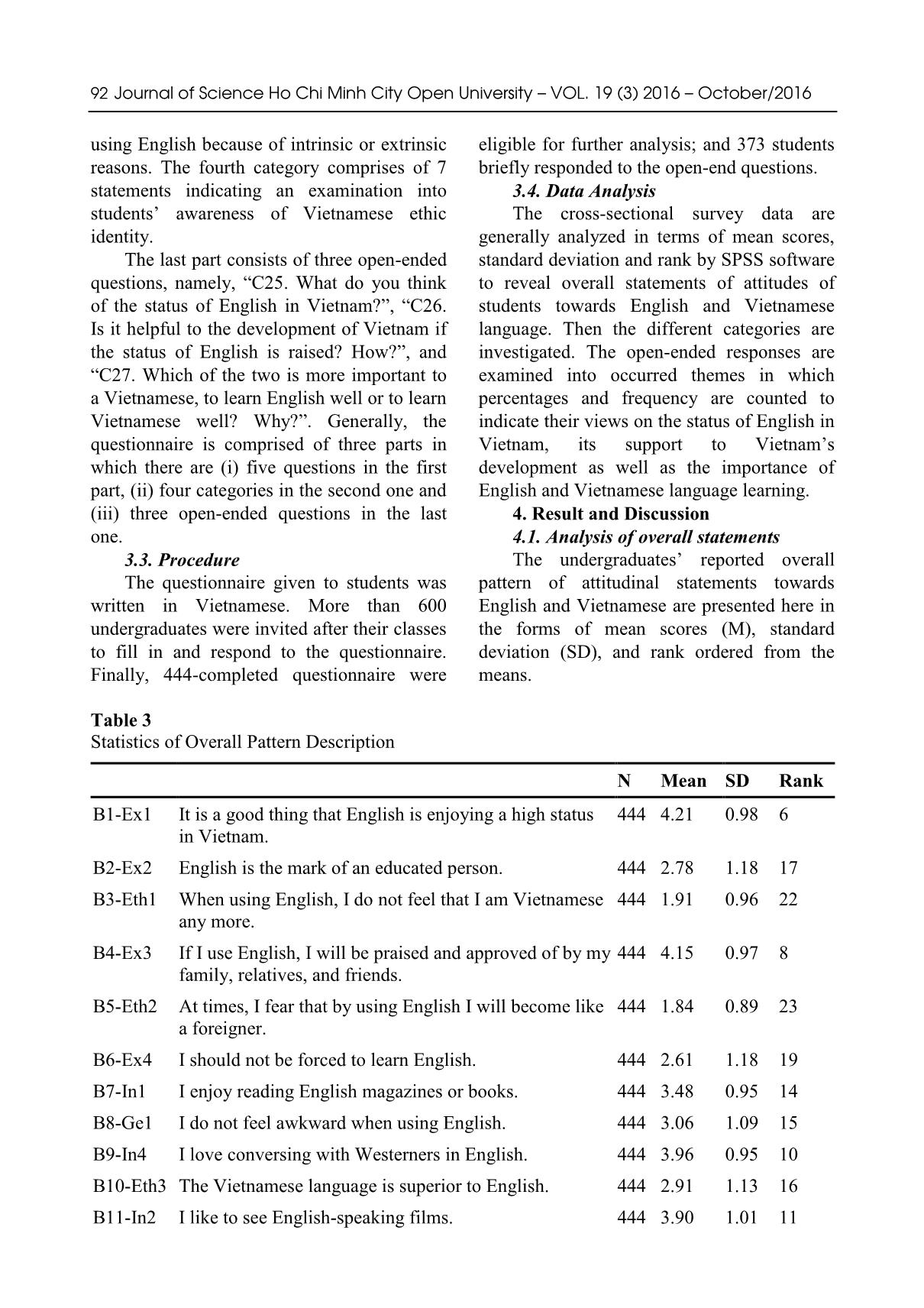
Trang 9
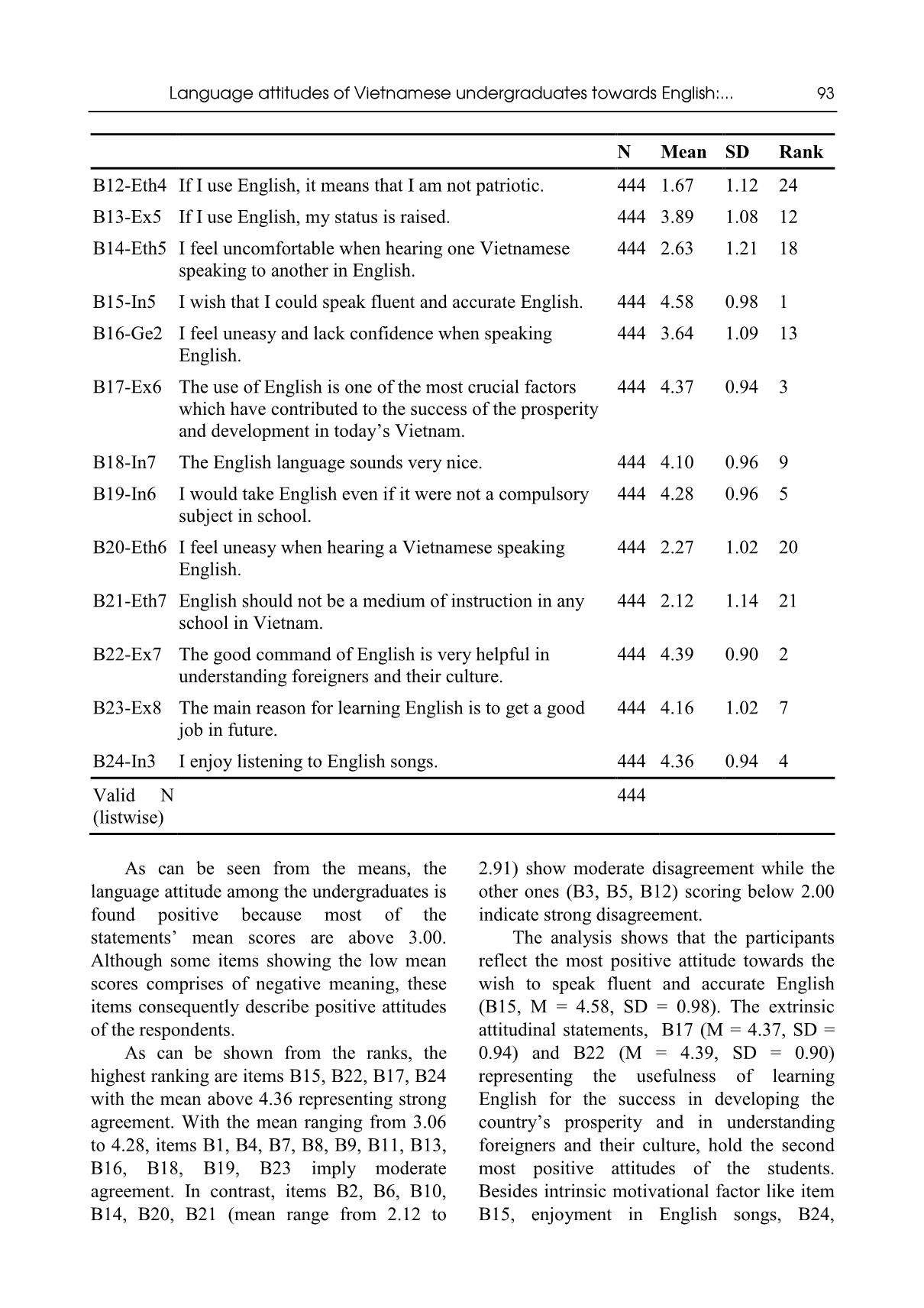
Trang 10
Tải về để xem bản đầy đủ
Tóm tắt nội dung tài liệu: Language attitudes of Vietnamese undergraduates towards English: An investigation at school of advanced studies of Ho Chi Minh city open university
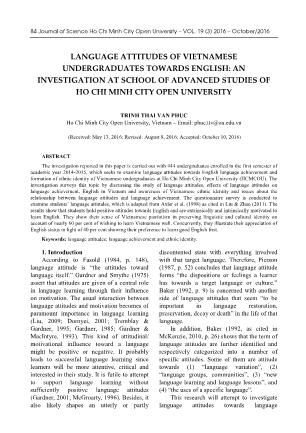
ry Table 6 Statistics of General Attitudinal Statements N Min Max Mean SD Rank B8-Ge1 444 1 5 3.06 1.09 2 B16-Ge2 444 1 5 3.64 1.09 1 Valid N (listwise) 444 These general attitudinal statements in this category seek to measure students’ confidence in using English. As can be seen from the table, students moderately agree more on that they are uneasy and unconfident in speaking English than they do not feel weird when using it. This suggests that HCMCOU students are not confident in using English. As a teacher, we should know how to intermingle more with them for clarifying some reasons and encourage them to speak out for learning and improving. 4.2.4 Analysis of ethnic identity category Table 7 Statistics of Ethnic Identity Description N Min Max Mean SD Rank B3-Eth1 444 1 5 1.91 0.96 5 B5-Eth2 444 1 5 1.84 0.89 6 B10-Eth3 444 1 5 2.91 1.13 1 B12-Eth4 444 1 5 1.67 1.12 7 Language attitudes of Vietnamese undergraduates towards English:... 97 N Min Max Mean SD Rank B14-Eth5 444 1 5 2.63 1.21 2 B20-Eth6 444 1 5 2.27 1.02 3 B21-Eth7 444 1 5 2.12 1.14 4 Valid N (listwise) 444 This last category in the second part presents seven statements investigating students’ ethno- linguistic identity of Vietnamese. As can be noted from table 10, students generally disagree with all the aforementioned items apart from the statement about the superior of Vietnamese to English, B10-Eth3 for which they are almost undecided in showing their consensus (M = 2.91, SD = 1.13, Rank = 1). They show their strongest disagreement on the point they are not patriotic if they use English, item B12- Eth4 with M = 1.67 (SD = 1.12, Rank = 7). The responses in this study are quite similar to those in Liu & Zhao (2011) except for statements that they agree (i) on the superior of Chinese to English and (ii) on the unpleasant feeling of hearing one Chinese speaking to another in English. In contrast, Vietnamese are undecided for (i’) the superior of English to Vietnamese and (ii’) uneasy feeling of hearing Vietnamese conversing in English. This finding, on the whole, reflects a positive awareness of Vietnamese ethno- linguistics identity that the undergraduates at HCMCOU do not agree on the points (a) that they will become a foreigner or will be not nationalistic if they use English and (b) that they are uncertain of making decisions about the unpleasant feeling of hearing Vietnamese conversing in English. This result is also in accordance with the result from Ibarraran, Lasagabaster, & Sierra (2008) that students’ positive attitudes towards their mother tongue are undeniable. The result is additionally highlighted and supported by the answers to the item C27-O3 concerning students’ choices of importance of good language learning - English or Vietnamese, and the reasons. The answers fall into 3 main themes, particularly, (1) equal importance of learning both English and Vietnamese well with the largest percentage of 44 % (N = 164) followed by (2) a priority of learning good English first with 40 % (N = 149), and (3) a preference of learning good Vietnamese with 16 % (N = 60). For the first theme, the high frequency of the reasons are (a) that learning only English gradually leads to a loss of national identity, (b) that learning only Vietnamese certainly results in obsolescence. In addition, they highlight (c) that it is not a matter of preferring to learn any of the two well, but it is a concern of appropriate learning and using Vietnamese and English to show their integration yet insolubility. For the second one with 40 percent among 373 responses, the high frequency of the answers go to the viewpoints (a) that Vietnamese should not been laid a learning emphasis since it is a mother tongue language, and we can use it well without much learning. Besides, they assert (b) that being excellent in Vietnamese is giftedly reserved for some specialists such as poets and linguists. In addition, (c) that being competent at English helps them with seizing better job opportunities, accessing international intellectual properties, and developing the country. For the third one with 16 percent of 373 answers, these responses’ high frequency lies in the points of view (a) that learning good Vietnamese first will lay the foundations for 98 Journal of Science Ho Chi Minh City Open University – VOL. 19 (3) 2016 – October/2016 learning a second/foreign language well and (b) that preserving the purity of Vietnamese helps to confirm the national identity. Besides, the viewpoint (c) that proficiency in Vietnamese language and culture can facilitate introducing the distinct Vietnamese identity to foreigners more effortlessly. In brief, this category visibly reveals a picture of patriotic Vietnamese students. Using English language is not a danger to Vietnamese identity as also found in Liu & Zhao (2011); Axler, Yang, & Stevens (1998). The finding further recommends that ethnic awareness should be intergrated in the the language teaching curriculum since the social status of a foreign language as English is so high in Vietnam and nearly half of the research population wish to be successful in learn English rather than Vietnamese. 5. Concluding remarks In conclusion, this present study is conducted to investigate undergraduates’ attitudes towards English with regard to their learning motivation and national identity formation. The results reveal that HCMCOU students hold positive attitude towards English and they are extrinsically and intrinsically motivated to learn English. They show their sense of Vietnamese patriotism in preserving linguistic and cultural identity on account of nearly 60 per cent of wishing to learn Vietnamese well. Concurrently, they illustrate their appreciation of English status in light of 40 per cent showing their preference to learn good English first. The findings further suggest (1) that instead of forcing students to learn English, teachers should encourage their learning with a practical, real, and convincing story of typical users’ success, (2) that their learning materials should be interested and unchallenging. In addition, (3) teachers should know how to build up their confidence in expressing English; and (4) ethnic identity component should be included in the teaching program. In the meantime, the study is conducted in the center of Vietnam with the participants from the School of Advanced Studies at the university. This picture of findings seems different if being conducted in different groups of students in the normal training, in other remote area of Vietnam, in other levels of study (secondary or high school, graduate, etc.), for example. Hence, further research in different settings is called to find out their language attitudes towards Vietnamese and English in a variety of backgrounds. 6. Acknowledgement This work is conducted with the support of academic officers and lecturers from School of Advanced Studies at HCMCOU. I wish to express my gratefulness to all of them and participants in my study References Atkinson, J. W. (1964). An introduction to motivation . Princeton, N.J.: Van Nostrand. Axler, M., Yang, A., & Stevens, T. (1998). Current language attitudes of Hong Kong Chinese adolescents and young adults. In M. C. Pennington (Ed.), Language in Hong Kong at Century's end (pp. 329-338). Hong Kong: Hong Kong University Press. Baker, C. (1992). Attitudes and language. Clevedon: Multilingual Matters. Bartels, N. (2009). Knowledge about language. In A. Burns, & J. C. Richards (Eds.), The Cambridge Guide to Second Language Teacher Education (pp. 125-134). New York: Cambridge University Press. Burstall, C. (1975). Factors affecting foreign-language learning: a consideration of some recent research findings. Language teaching and Linguistics: Abstracts 8. Chamot, A. (1995). The teacher’s voice – action research in your classroom. ERIC/CLL News Bulletin, 18(2), 5-8. Language attitudes of Vietnamese undergraduates towards English:... 99 Creswell, J. W. (2012). Educational Research: Planning, Conducting, and Evaluating Quantitative and Qualitative Research (4th ed.). Boston, USA: Pearson. Denham, P. (1992). English in Vietnam. World Englishes, 11(1), 61-69. Dornyei, Z. (2001). Teaching and researching motivation. Longman: Pearson Education Limited. Eastman, C. (1985). Establishing social identity through language use. Journal of language and Social Psychology, 4, 1-20. Ellis, G. (1996). How culturally appropriate is the communicative approach? ELT Journal, 50(3), 213-218. Fasold, R. W. (1984). The Sociolinguistics of Society. London: Blackwell. Garder, R. C., & MacIntyre, P. D. (1991). An instrumental motivation in language study: "Who say it isn't effective?". Studies in Second Language Acquisition, 13, 57-72. Garder, R. C., Lalonde, R. N., & Moorcroft, R. (1985). The role of attitudes and motivation in second language learning: Correlational and experimental considerations. Language Learning, 35(2), 207-227. Gardner, R. C. (1979). Social psychology aspects of second language acquisition. In H. Giles, & R. S. Clair, Language and Social Psychology. Oxford: Blackwell. Gardner, R. C. (1985). Social psychology and second language learning: the roles of attitudes and motivation. London: Edward Arnold. Gardner, R. C. (2001). Intergrative motivation and second language acquisition. In Z. Dornyei, & R. Schmidt (Eds.), Motivation and Second Language Acquisition (pp. 1-20). Honolulu, HI: University of Hawaii Press. Gardner, R. C., & Lambert, W. E. (1972). Attitudes and motivation in second language learning. Rowley, MA: Newbury House. Gardner, R. C., & MacIntyre, P. D. (1993). A student's contributions to second language learning. Part II: affective variables. Language Learning, 26, 1-11. Gardner, R. C., & Smythe, P. C. (1975). Motivation and second language acquisition. Canadian Modern Language Review, 31, 218-230. Giles, H., & Johnson, P. (1987). Ethnolinguistic identity theory: a social psychological approach to language maintenance. International Journal of the Sociology of Language, 68, 69-99. Gudykunst, W. B., & Schmidt, K. L. (1987). Language and ethnic identity: an overview and prologue. Journal of Language and Social Psychology, 5, 291-301. Hermann, G. (1980). Attitudes and success in children's learning English as a second language: the motivational vs. the resultative hypothesis. English Language. Ibarraran, A., Lasagabaster, D., & Sierra, J. M. (2008). Multilingualism and language attitudes: local versus immigrant students' perceptions. Language Awareness, 17, 326-341. John, R. T. (2002). Cognitive grammar. Oxford: Oxford Textbooks in Linguistics. Kumaravadivelu, B. (2003). Macrostrategies for language learning. London: Yale University Press. Le, V. (2000). Language and Vietnamese pedagogical contexts. In J. Shaw, D. Lubelska, & M. Noullet (Ed.), Proceedings of the Fourth International Conference on (pp. 73-80). Bangkok: Asian Institute of Technology. Lewis, M., & Hill, J. (2005). Language and Language Learning. London: Oxford University Press. Lin, A., & Detaramani, C. (1991). By Carrot and By Rod: Extrinsic motivation and English attainment of tertiary students in Hong Kong. In M. C. Pennington (Ed.), Language in Hong Kong at Century's End (pp. 285-299). Hong Kong: Hong Kong University Press. Liu, M. (2009). Reticence and anxiety in oral Engish lessons. Berne: Peter Lang AG. Liu, M., & Zhao, S. (2011, September). A current language attitudes of mainland Chinese unviersity students. Journal of Language Teaching and Research, 2(5), 963-968. 100 Journal of Science Ho Chi Minh City Open University – VOL. 19 (3) 2016 – October/2016 Lukmani, Y. M. (1972). Motivation to learn and language proficiency. Language Learning, 22(2), 261-273. McGroarty, M. (1996). Language attitudes, motivation, and standard. In S. L. McKay, & N. H. Hornberger (Eds.), Sociolinguistics and Language Teaching (pp. 3-46). New York: Cambridge University Press. McKenzie, R. M. (2010). Educational Linguistics: The Social Psychology of English as a Global Language. Attitudes, Awareness and Identity in the Japanese Context (Vol. 10). London: Springer. Mitchell, R., & Myles, F. (2004). Second Language Learning Theories (2nd ed.). London, Great Britain: Hodder Arnold. Ngan, N. (Dec, 2012). How English Has Displaced Russian and Other Foreign Languages in Vietnam Since "Doi Moi". International Journal of Humanities and Social Science, 26(23), 259-266. Pierson, H. D. (1987). Language attitudes and language proficiency: a review of selected research. In R. Lord, & C. Helen (Eds.), Language Education in Hong Kong. The Chinese University Press. Pierson, H., Fu, G., & Lee, S. (1980). An analysis of the relationship between language attitudes and English attainment of secondary students in Hong Kong. Language Learning, 30(2), 289-315. Richards, J. C., & Rodgers, T. S. (2001). Approaches and Methods in Language Teaching (2nd ed.). Cambridge: Cambridge University Press. Shapiro, L. (1995). English language training in Vietnam in the era of Doi Moi: Ho Chi Minh City: A descriptive study. The School for International Training Brattleboro, Vermont. Vermont: Retrieved from ERIC database. ( ED418605). Spolsky, B. (1989). Conditions for second language learning. Oxford: Oxford University Press. Strong, M. (1984). Intergrative Motivation: "Cause or result of successful second language acquisition?". Language Learning, 34, 1-13. Thinh, D. H. (1999). Foreign language education policy in Vietnam: The emergence of English and its impact on higher education. The Fourth International Conference on Language and Development Proceedings. Ha Noi, Vietnam. Thinh, D. H. (2006). The role of English in Vietnam's foreign language policy: A brief history. Paper presented at the 19th Annual EA Education Conference. Australia. Toan, V. (2010). Tieng Anh va chinh sach ngoai ngu o Viet Nam thoi hoi nhap (English and foreign language policy in Vietnam in the integration era). Ngon Ngu, 5(252), 27-37. Tran, L. T. (2007). Learners’ motivation and identity in the Vietnamese EFL writing classroom. English Teaching: Practice and Critique, 6(1), 151-163. Tremblay, P., & Gardner, R. (1995). Expanding the motivation construct in language learning. Modern Language Journal, 79, 505-518. Tuan, L. T. (2012). An Empirical Research into EFL Learners’. Theory and Practice in Language Studies, 2(3), 430-439. Yule, G. (2014). The study of language (5th ed.). New York: Cambridge University Press.
File đính kèm:
 language_attitudes_of_vietnamese_undergraduates_towards_engl.pdf
language_attitudes_of_vietnamese_undergraduates_towards_engl.pdf

